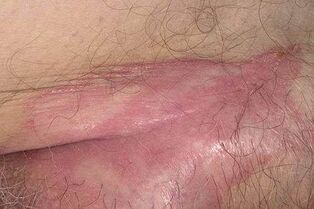Psoriasis is one of the most serious dermatological diseases. The disease is of an autoimmune nature that is incurable and occurs in patients of all ages. Another feature of the disease is its rippling nature. Relapses were followed by episodes of calm and vice versa. Remission time always depends on the type, type of disease as well as the individual characteristics of the patient.

The main symptoms of psoriasis are nasty pink or red spots that appear on different parts of the human body. In medical practice, such rashes are often referred to as plaques or papules. In most cases, these plaques are covered with the characteristic scales of the pathology and protrude a few millimeters above the healthy surface of the skin. In addition, signs of psoriasis include such signs as intense itching in the affected area and inflammation.
Psoriasis, an unknown cause, is diagnosed in every tenth of people who consult their doctors about skin problems. The disease is common mainly in adults, but the disease is common in children. There is a risk of being residents of countries with cold, humid climates. The incidence of the disease is higher among people in cold countries than in people living in warm climates.
What is psoriasis: a theory of the origin of the disease
So far it has not been possible to find out the exact cause of the disease, it is not clear how psoriasis started. Even the joint efforts of the world scientists have not allowed to give an answer to the question of why psoriasis appeared? According to Wikipedia, in modern medical practice, there are several theories about the emergence of this disease. However, none of them are officially backed up. Theories about the development of psoriasis include:
- Immune.
- I am passed down.
- Theory of hormone disruption.
- Theory against stress background.
- Metabolic disturbances.
- The origin of the virus.
Based on clinical studies and laboratory data, scientists have been able to identify a number of perspectives that suggest the possible cause of the development of pathology.
Immunology
Many scientists identify the cause of psoriasis in children and adults by characteristics of the immune system. This theory is by far the most popular. In the opinion of its founders, the appearance of plaques on the body of a different nature occurs due to the action of immune cells, which consider certain areas of the dermis to be invaders. comb. As a result of this, skin becomes inflamed and intensely red.

The cause of psoriasis on the body from the point of view of immunological theory can be as follows:
- rubbing the skin with clothing and shoes;
- is burned;
- frostbite;
- microcracks;
- scratched.
According to the test results, it is possible to determine the presence of a large number of immune cells in the places where psoriatic spots appear. This is a validated part of immunological theory.
Genetic Theory
Its other name is genetic theory. Many scientists believe that this disease has a genetic nature. This is proved through many surveys, the results show that in case the mother has a disease, the risk of the child getting sick is 20-25%. If both parents have psoriasis, the rate will increase to 75.
Genetic predisposition is considered to be one of the main factors in the development of the disease. With a combination of several provoking factors, the risk of pathology increases dramatically.
Important! If a child's parents suffer from psoriasis, this cannot be a one hundred percent guarantee that the child will definitely develop the same disease. Genetics only increases the risk of disease.
Endocrine theory
The causes of psoriasis in the hands, back, head and other parts of the body are also partly explained according to endocrine theory. Here, scientists assume that pathological changes in the dermis occur due to hormonal imbalances in the body. Disorders of the normal functioning of the endocrine system lead to a decrease in the vital healthy activity of the cells of the dermis.
Hormone imbalances can occur for the following reasons:
- pregnancy;
- menstruation;
- take hormonal drugs;
- puberty.
Important! According to the results of medical research, not all cases can be observed a violation of the hormone concentration in the patient's blood. With these facts, the endocrine system cannot be considered fundamental.
Neurobiology
The onset of psoriasis also supports the theory of neurological causes. This view explains the occurrence of the disease as a result of stress and strong emotional experiences. The representatives of this theory believe that the cause of the occurrence of psoriasis may lie in the malfunction of the central nervous system.

According to experience, the patient has a phenomenon such as nerve wall disorders. This causes vascular narrowing and impaired blood flow. As a result, the rash develops on the body as a scaly plaque.
According to surveys in more than half of psoriasis patients, the onset of the disease is due to intense and stressful experiences.
Exchange theory
The reasons for the occurrence of psoriasis in women and men may also lie in a violation of metabolic processes in the body. This is the opinion of the representatives of the metabolic disorder theory.
According to medical research, it is possible to find a clear link between psoriasis and metabolic disorders in the body. Violation of lipids and other processes leads to changes in blood composition, impaired immunity and other negative consequences.
The following factors can cause metabolic disturbances:
diabetes- ;
- kidney and liver disease;
- unbalanced diet;
- sedentary lifestyle.
Virus theory
Some scientists explain that the cause of psoriasis is a viral infection or the presence of chronic inflammatory foci in the body. This theory is to some extent genetically related. The representatives of this view believe that infection can become the driving force for the development of the pathology.
What factors can cause psoriasis?
In addition to theories about the origin of the disease, there are a number of provoking factors. These include:
- Unhealthy diet, eating food that causes allergies, inadequate amounts of vitamins and minerals.
- Bad habits like alcohol and tobacco, as well as taking drugs.
- Incorrectly taken or canceled at the wrong time.
- Various lesions of the dermis.
- Hormonal imbalances in the body.
Genetics and a combination of several triggers can lead to a disease like psoriasis. It is very important to make a timely diagnosis and initiate appropriate treatment. This will help avoid many negative future consequences.
Why psoriasis is dangerous
It may not cause much discomfort at first, but if left untreated, the disease will worsen with continuous relapses. Therefore, it is important to promptly initiate treatment and prevent the development of psoriasis. As a precaution, you can use traditional medicine and its means, but only with the consent of a doctor.
Now that you know the cause of psoriasis, you need to start treating it. When you have your first symptoms, see your doctor, buying self-medication can seriously harm your health.

























